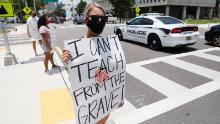(CNN)New Covid-19 cases in the US may be on the decline but some officials across the country's heartland reported worrisome news this week.
Kansas Gov. Laura Kelly said Monday the state had reached an "unfortunate milestone" by reporting at least one case of the virus in every county.
The state's infection rate, she said, "continues an alarming trend in the wrong direction."
To make matters worse, Kelly said, as college students return to campus, several clusters have been reported at universities across the state. Last week, the University of Kansas reported more than 80 cases of the virus. The college is among dozens of others across the country that have reported Covid-19 cases after students moved into dorms.
In Kentucky, Gov. Andy Beshear warned cases could spike again as the state reported more deaths last week than "in any other week battling the virus."
Beshear said the state is seeing "troubling signs" and is at "the same moment that Kentucky was at in the beginning of the summer."
"More people are trying to get out of the quarantine than the health department has recommended," the governor said.
The governors' messages come as the country's seven-day average of daily deaths dipped below 1,000 over the weekend for the first time since July, offering hope that the summer surge may be waning. But with experts' grim forecasts for what the fall and winter could look like in the US, health experts say now isn't the time to ease prevention measures.
US Centers for Disease Control and Prevention Director Dr. Robert Redfield expressed concern last week about the heart of the country getting "stuck," while other parts of the US, including across the South, were reporting improvements.
"That is why it's so important for Middle America to recognize the mitigation that we talked about ... it's for Middle America too, the Nebraskas, the Oklahomas," Redfield said. "We don't need to have a third wave in the heartland right now."
The US has recorded more than 5.7 million infections and at least 177,276 deaths, according to Johns Hopkins University.
The role super spreading events play
Throughout the summer, US leaders and health officials have cautioned against large social gatherings saying it was those types of events that helped fuel a surge in positive cases. Earlier this month, a Georgia study showed super spreading events have been especially important in driving the pandemic in rural areas.
But the warnings haven't brought the gatherings to a halt.
In South Dakota earlier this month, thousands from all over the US gathered for the Sturgis Motorcycle Rally, a massive annual event that usually brings in about 500,000 tourists. Experts said the event had the potential to become a super-spreader event.
In Minnesota, at least 27 cases were linked to the rally, two of which were people who worked or volunteered at the event, according to Kris Ehresmann, the Infectious Disease Division Director at the state's health department. At least seven cases in Nebraska's Panhandle region have been tied to the rally as well as at least two cases reported by South Dakota officials. One positive result was a person who worked at a tattoo parlor in Sturgis, while the other was an individual who spent hours at a bar during the rally.
Last week, Maine CDC officials issued a citation to a venue that exceeded the indoor gathering limit of 50 individuals when it hosted a wedding reception earlier this month that has since been linked to a Covid-19 outbreak.
More than two dozen confirmed cases were associated with the wedding and reception. One of the individuals that tested positive following the wedding reception has died, Robert Peterson, the CEO of Millinocket Regional Hospital, said in a statement.
Iowa officials confirm first child death
Iowa's health department confirmed the first death of a child from Covid-19 complications in a news release this week. The child was under the age of five and died in June, according to the release. The child also had "significant underlying health conditions," health officials said.
Earlier this month, a 6-year-old girl became the youngest person in Florida to die of Covid-19 complications. In July, health officials reported the death of a 9-year-old girl who also died of Covid-19 complications. Kimora "Kimmie" Lynum had no known underlying health conditions, her family said.
The children's deaths come as many schools across the country have welcomed students back to class, while others have opted to begin the year remotely.
Last week, the CDC updated its school guidance in order to better inform administrators' decisions about opening schools and limiting risks.
The guidelines say in general, children are less likely to have severe symptoms than adults. The risk of teachers, school administrators and other staff will, however, "mirror that of other adults in the community" if they get sick, the guidelines said.
Some colleges have also opted to go online while others, who welcomed students back to campus, have -- in some cases -- reported hundreds of Covid-19 infections.
CNN's Jennifer Henderson, Gisela Crespo, Laura Ly and Pierre Meilhan contributed to this report.

 5 years ago
584
5 years ago
584 






